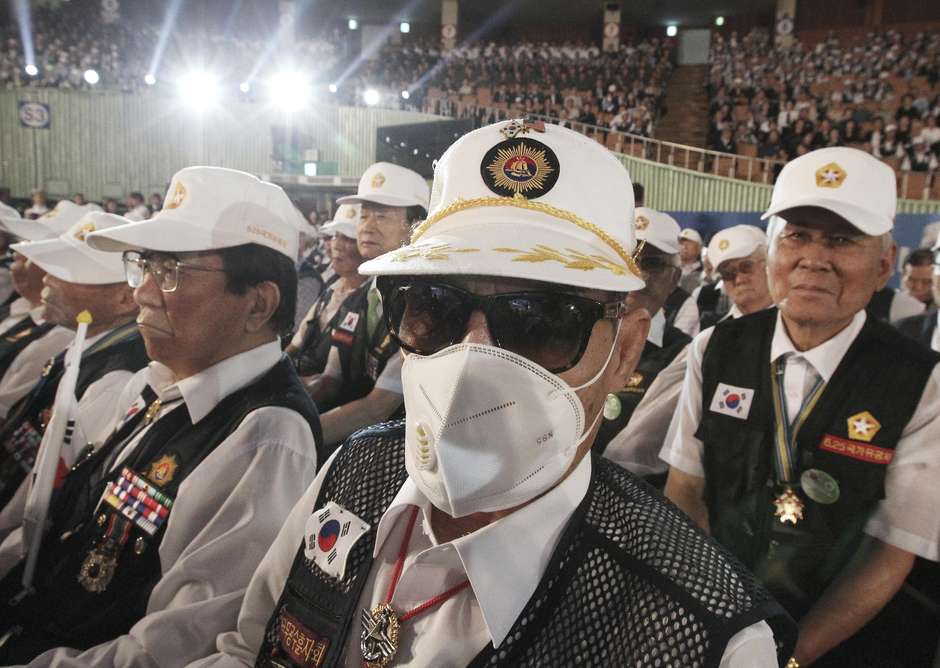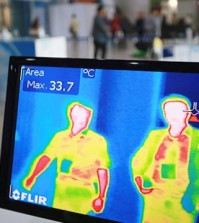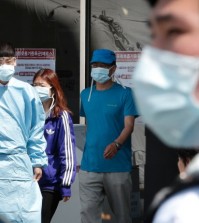- California Assembly OKs highest minimum wage in nation
- S. Korea unveils first graphic cigarette warnings
- US joins with South Korea, Japan in bid to deter North Korea
- LPGA golfer Chun In-gee finally back in action
- S. Korea won’t be top seed in final World Cup qualification round
- US men’s soccer misses 2nd straight Olympics
- US back on track in qualifying with 4-0 win over Guatemala
- High-intensity workout injuries spawn cottage industry
- CDC expands range of Zika mosquitoes into parts of Northeast
- Who knew? ‘The Walking Dead’ is helping families connect
Looking back on MERS outbreak, S. Korea becomes lesson for other countries

An unidentified South Korean war veteran wears a mask as a precaution against the Middle East Respiratory Syndrome (MERS) during a ceremony to mark the 65th anniversary of the outbreak of the Korean War in Seoul, South Korea, Thursday, June 25, 2015. South Korea’s MERS outbreak originated from a 68-year-old man who had traveled to the Middle East, where the illness has been centered, before being diagnosed as the country’s first MERS patient last month. (AP Photo/Ahn Young-joon)
SEJONG, July 8 (Yonhap) — With the outbreak of Middle East Respiratory Syndrome (MERS) in South Korea apparently coming to an end, experts say the deadly disease could have been eliminated much sooner with just a little more prudence and understanding about communicable diseases.
So far, South Korea has reported 186 cases of the potentially deadly disease that has claimed 34 lives since the country reported its first case on May 20.
The number of MERS patients has remained unchanged since Sunday while one additional fatality was reported since the beginning of the month, apparently indicating that the outbreak may finally be on the wane.
However, many believe the outbreak could, or should, have ended before it inflicted any real damage on the local public and economy.
They blame the government as well as local hospitals for letting the outbreak become the world’s largest outside of Saudi Arabia where the deadly disease was first identified in 2012.
According to the Ministry of Health and Welfare, 1,383 MERS cases were reported throughout the world as of July 1, with 1,042 of them reported in Saudi Arabia.
The disease has claimed 533 lives globally with 460 or over 86 percent of total fatalities occurring in Saudi Arabia.
Since 2012, the disease has been reported in 24 other countries, but South Korea is the only other country in the world besides Saudi Arabia to have reported more than 100 confirmed cases.
The country’s first or index case was confirmed in a 68-year-old male who traveled to the Middle East in mid-April before returning home on May 4.
The man had reportedly developed apparent symptoms of MERS on May 11 but his diagnosis came 10 days later, partly because he had failed to mention his trip to the Middle East, prompting his unsuspecting doctors to look in the wrong places for the cause of his ailment.
The patient himself was blamed for the doctors’ initial failure to diagnose his disease, though the doctors later noted the man may had already been unable to give a full and correct account of his possible exposure to MERS as he appeared to be confused, or nearly unconscious, when he first came to the hospital.
However, the spread of the disease since then has largely been blamed on the government’s refusal to share related information, including the names of hospitals affected by the potentially deadly disease, with the general public, let alone other hospitals.
People, ignorant of hospitals affected by MERS simply due to the lack of such information, continued to seek medical attention from those exposed to MERS, while hospitals, also unaware which of their patients had been exposed, failed to quarantine those who needed to be dealt with care.
The government belatedly released the names of MERS-affected hospitals on June 7, but after the number of MERS patients had already reached 64.
The list of MERS-affected hospitals included Samsung Medical Center, one of the largest and most famous hospitals in South Korea run by the country’s largest conglomerate Samsung. The hospital had daily treated hundreds of patients until the list was released.
The Samsung hospital is responsible for the infection of 49 percent, or 91 out of all 186 people diagnosed here so far.
An investigation team of experts from the South Korean government and the World Health Organization (WHO) has also pointed to the lack of necessary information as a reason for the spread of the disease.
“A failure to release the related information swiftly and transparently was one of reasons for the overall failure in the country’s initial response to the outbreak,” the joint investigation team said earlier.
The WHO has also cited the country’s tradition of people staying with their sick family members in hospital rooms as a major factor that triggered the MERS outbreak here.
Still very little is known about the disease, including how exactly it is transmitted, while no vaccine or treatment is currently available for MERS.
However, many experts, including WHO officials, believe the disease would not have spread so widely in South Korea had the public had a better understanding of infectious diseases in general.
“The committee noted that there are still many gaps in knowledge regarding the transmission of this virus between people, including the potential role of environmental contamination, poor ventilation and other factors, and indicated that continued research in these areas was critical,” WHO emergency committee on MERS coronavirus (MERS-CoV) said in a statement released June 17.
The committee said factors contributing to the spread of MERS-CoV in South Korea included the “lack of awareness among health care workers and the general public about MERS” and “close and prolonged contact of infected MERS patients in crowded emergency rooms and multi-bed rooms in hospitals.”
To help better respond to a future outbreak of an infectious disease, the country has revised the related law to allow immediate disclosure of people and hospitals affected by infectious diseases.
The revision, once enacted, will also boost the number of communicable disease investigators in the country to at least 64 from the current 34.
Experts also point out that the government should boost its cooperation with provincial governments and ramp up efforts to expand the country’s network of public hospitals and modernize their facilities.
















Pingback: List Of Respiratory Nursing Diagnosis | Rn Nurse School
Pingback: List Of Respiratory Nursing Diagnosis | All about nursing